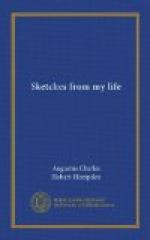Having made two round trips, we could afford to take it easy for a short time, and as the dark nights would not come on for three weeks, we gave the little craft a thorough refit, hauling her up on a patent slip that an adventurous American had laid down especially for blockade-runners, and for the use of which we had to pay a price which would have astonished some of our large ship-owners. I may mention that blockade-runners always lived well; may be acting on the principle that ‘good people are scarce’; so we kept a famous table and drank the best of wine. An English man-of-war was lying in the harbour, whose officers frequently condescended to visit us, and whose mouths watered at what they saw and heard of the profits and pleasures of blockade-running. Indeed, putting on one side the sordid motives which I dare say to a certain extent actuated us, there was a thrilling and glorious excitement about the work, which would have well suited some of these gay young fellows.
Time again came round too soon, and we had to start on another trip, and to tear ourselves away from all sorts of amusements, some of us from domestic ties: for there were instances of anxious wives who, having followed their husbands to the West Indies, vastly enjoyed all the novelty of the scene. These ladies had their pet ships, in whose captains they had confidence, and in which they sent private ventures into the Confederacy; and in this way some of them made a nice little addition to their pin-money. I don’t know that any of them speculated in Cockle’s pills or corsages, but I heard of one lady who sent in a large quantity of yellow soap, and made an enormous profit out of her venture.
Having completed the necessary alterations and repairs, and made all snug for a fresh run, we started again from the port of Nassau. We had scarcely steamed along the coast forty miles from the mouth of the harbour, when we discovered a steamer bearing down on us, and we soon made her out to be a well-known, very fast Yankee cruiser, of whom we were all terribly afraid. As we were still in British waters, skirting the shore of the Bahamas, I determined not to change my course, but kept steadily on, always within a mile of the shore. On the man-of-war firing a shot across our bows as a signal for us to heave to, I hoisted the English colours and anchored. An American officer came on board, who, seeing unmistakable proofs of the occupation we were engaged in, seemed very much inclined to make a prize of us; but on my informing him that I claimed exemption from capture on the ground of the vessel being in British waters, he, after due consideration, sulkily wished me good morning and went back to his ship. She continued to watch us till the middle of the night, when I imagine something else attracted her attention, and she steamed away. We, taking advantage of her temporary absence, weighed our anchor and were soon far out at sea.




